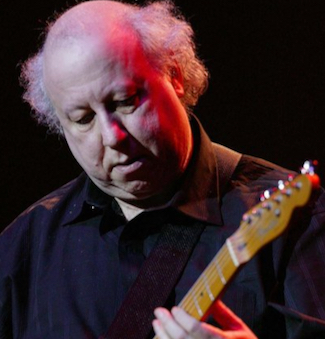
British blues guitarist Peter Green, who wrote the underground music staple “Black Magic Woman” for his band Fleetwood Mac, has died. He was 73.
While Green and the first incarnation of Fleetwood Mac were dedicated to propagating American blues, he was no purist. He visited the shadowlands with adventurous compositions such as “Albatross,” “Black Magic Woman” and “The Green Manalishi.”
Green, who came to fame with John Mayall’s Bluesbreakers, was an enthusiastic user of psychedelic drugs as a young adult. He suffered mental health issues for most of his career.
Green’s lawyers announced the guitar great’s death July 25, saying he passed in his sleep.
“No one has ever stepped into the ranks of Fleetwood Mac without a reverence for Peter Green and his talent,” group drummer Mick Fleetwood said after hearing of his ex-bandmate’s death.
Another British teen guitar prodigy of the late 1960s, Peter Frampton, reacted to Green’s death by saying he was “one of the most tasteful guitar players ever.” B.B. King had credited him with “the sweetest tone I ever heard.” Green also was a fine singer, with a relaxed style reminiscent of J.J. Cale and Eric Clapton.

Green and Fleetwood Mac were regulars on the pop festival circuit of the late ’60s and played the progressive music halls. The band’s sound was defined by Green’s precise playing — influenced by the guitar kings of the U.S. — and the slide heroics of Jeremy Spencer. A third guitarist, Danny Kirwin, joined after the group’s second album and was a major contributor to Green’s “Albatross.”
Green left Fleetwood Mac in 1971 and drifted in and out of the music business for decades, spending time in a mental institution and receiving shock therapy. “It was drugs that influenced me a lot,” Green said. “I took more than I intended to. I took LSD eight or nine times.”
He resurfaced in the early 1980s, recording solo works and playing on others’ recordings, including Fleetwood Mac’s “Tusk.” In the 1990s, he formed the Peter Green Splinter Group, whose steady output included “Me and the Devil,” a CD box set that teamed Green’s Robert Johnson covers with Johnson’s original recordings.
“In his deepest work he took the music to places Robert Johnson would have recognized, but never described,” the veteran rock critic Greil Marcus wrote of Green just last March.
In 1998, Green was inducted into the Rock and Roll Hall of Fame with Fleetwood Mac. He performed “Black Magic Woman” at the induction ceremony with Carlos Santana, preferring to play from the side-stage shadows as Santana held court.
As a teenager, Green replaced Eric Clapton in John Mayall’s Bluesbreakers and stayed for a year before starting Fleetwood Mac. Unlike Clapton, who went on to form Cream, Green remained by and large rooted in the blues and did not pursue the hot genre of the day, psychedelic music.
Still, the influence of the times and the hallucinogenic drugs clearly can be heard in some of his greatest songs:
The cinematic and brooding “Albatross” updated Santo & Johnny’s instrumental “Sleep Walk” for the underground era. “Black Magic Woman” brought a voodoo vibe to the British blues sound — the song soon turned into a freeform-FM radio staple by Santana (“Abraxas”). “The Green Manalishi (With the Two Prong Crown)” was Green’s final song for Fleetwood Mac, apparently inspired by a drug-driven dream about a demon dog (note howling at the end). Fleetwood Mac turned the song into a 13-minute rave-up on the “Live in Boston” recordings. It has been covered extensively by hard rock bands.
Green was honored early this year at the London Palladium with a celebrity tribute show, with participants including Mick Fleetwood, John Mayall, David Gilmour, Pete Townshend, Christine McVie and Steve Tyler.
He did not attend.
Memory eternal! Thank you for the wonderful music and memories!
Merci pour ta musique Peter … repose en paix
I haven’t felt this sad for a musician since we lost Jack Bruce, and Mike Bloomfield. Peter Green’s Fleetwood Mac made British Blues a big part of
Progressive rock, along with bands like Love Sculpture and Bakerloo. I’ve been a fan of Peter Green since the first time I heard him in John Mayall’s Blues Breakers on the radio, KPPC. My condolences to his family.
Peter Green RIP my brother.
After hearing Peter Green’s playing on The John Mayall & The Bluesbreakers, “A Hard Road” LP, l can imagine Mayall thanking the gods for blessing him with yet ANOTHER toweringly talented guitarist…& then Mick Taylor after Green! Ol’ John launched some iconic musicians indeed.